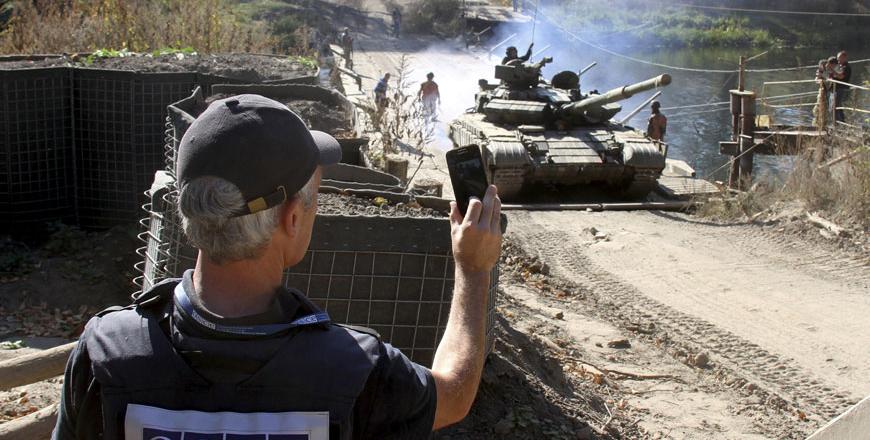You are here
Ukraine turns to young pro-EU premier to battle crises
By AFP - Apr 14,2016 - Last updated at Apr 14,2016
KIEV — Ukraine's parliament on Thursday appointed pro-Western speaker Volodymyr Groysman as prime minister in a bid to end months of political gridlock and unlock vital aid to the war-tornstate.
Lawmakers voted by 257 to 50 to approve the resignation of Prime Minister Arseniy Yatsenyuk — condemned by President Petro Poroshenko for losing the public's trust — and select Groysman in the first Cabinet overhaul since Ukraine's 2014 pro-EU revolt.
"We have to accelerate the pace of reforms. I would like to see this government restore the public's trust," the 38-year-old Poroshenko protege told deputies shortly before his confirmation.
Poroshenko himself called Groysman "a politician from a new generation" who could tackle "the real possibility of Ukraine turning into a state of chaos".
The appointment comes with Ukraine embroiled in a pro-Russian separatist insurgency in the east that has claimed nearly 9,200 lives and suffering an economic meltdown that has erased people's savings and seen inflation soar above 40 per cent last year.
Ukraine's youngest-ever premier will also have to show quick returns on a fight against corruption that has permeated all levels of government and was one of the factors behind three months of protests that brought down the Russian-backed leadership in February 2014.
EU foreign policy chief, Federica Mogherini, called Groysman's appointment "a crucial development at a time when new momentum in the country is badly needed”.
But Russian President Vladimir Putin said he hoped the new government "will not be guided by some sort of phobias or act in the interest of foreign agencies" — a veiled reference to Brussels and Washington.
'Coalition builder'
The fast-rising new Cabinet chief is a lawyer by training who only two years ago was a relative unknown serving as mayor of the small western Ukrainian city of Vinnytsia.
He moved to Kiev and joined the government after the 2014 ouster of Ukraine's Moscow-backed leadership and the country's decision to strike a landmark EU trade and political association pact.
Groysman was elected to parliament on Poroshenko's party ticket in October 2014 and became speaker the following month.
He is seen as a coalition builder who has gained stature by keeping the notoriously rowdy parliament in relative peace.
But some economists worry that the mild-mannered Groysman may lack the toughness needed to stand up to a handful of tycoons who have dominated Ukrainian politics and made the former Soviet republic a breeding ground for graft.
"I do not believe that this government will drive reforms forward," Kiev's International Centre for Policy Studies analyst Anatoliy Oktysyuk told AFP.
"There are too many obstacles standing in his way."
The new government may draw further concern from investors because it no longer features the respected US-born former finance minister, Natalie Jaresko, or two other foreign technocrats Poroshenko enlisted in December 2014 to help stem Ukraine's economic nosedive.
Jaresko's post has been filled by Oleksandr Danylyuk — the deputy head of Poroshenko's administration whom Nomura International strategist Timothy Ash described as "progressive/technocratic".
Both Foreign Minister Pavlo Klimkin and Defence Minister Stepan Poltorak retain their posts in a government that will have a whopping six deputy premiers.
Yatsenyuk's fall from grace
Yatsenyuk became prime minister days after the downfall of the Kremlin-backed regime and won renown for his scathing criticism of Russia during its March 2014 annexation of Crimea and the pro-Moscow insurrection that broke out weeks later.
But he saw his party's approval plunge to around 2 per cent due to a broad public perception that he was working in tandem with the very oligarchs who had enjoyed enormous clout under previous administrations and whose wings he had vowed to clip.
Yatsenyuk announced that he was quitting on Sunday — almost two months after surviving a no-confidence vote in parliament.
The Ukrainian government has been paralysed since the failed motion because Yatsenyuk's days seemed numbered and intense backroom battles raged over who would fill the new Cabinet's seats.
IMF chief Christine Lagarde said in February she could not see how funding — suspended since the end of last year because of Ukraine's failure to follow through on some of its economic pledges — could resume until a united new government is formed.
Related Articles
KIEV — Ukraine on Thursday reported the heaviest rebel shelling attack in the separatist east for a year in what the president said could be
KIEV — Ukrainian Prime Minister Arseny Yatseniuk tendered his resignation on Sunday, paving the way for Western-backed coalition parties to
DONETSK, Ukraine — Ukraine's pro-Russian insurgents took a major step toward political reconciliation Tuesday by announcing they will push b
















